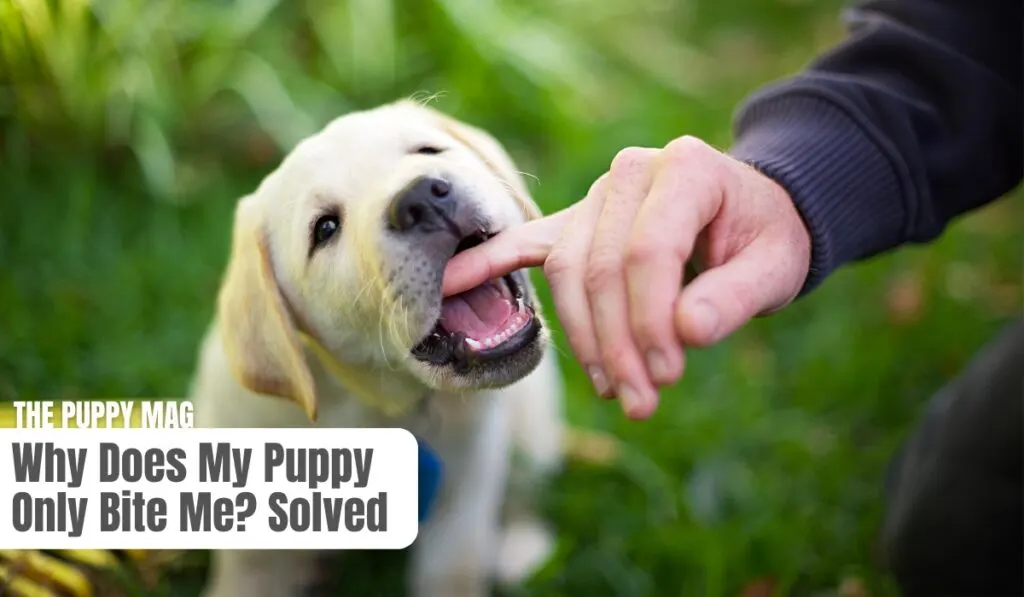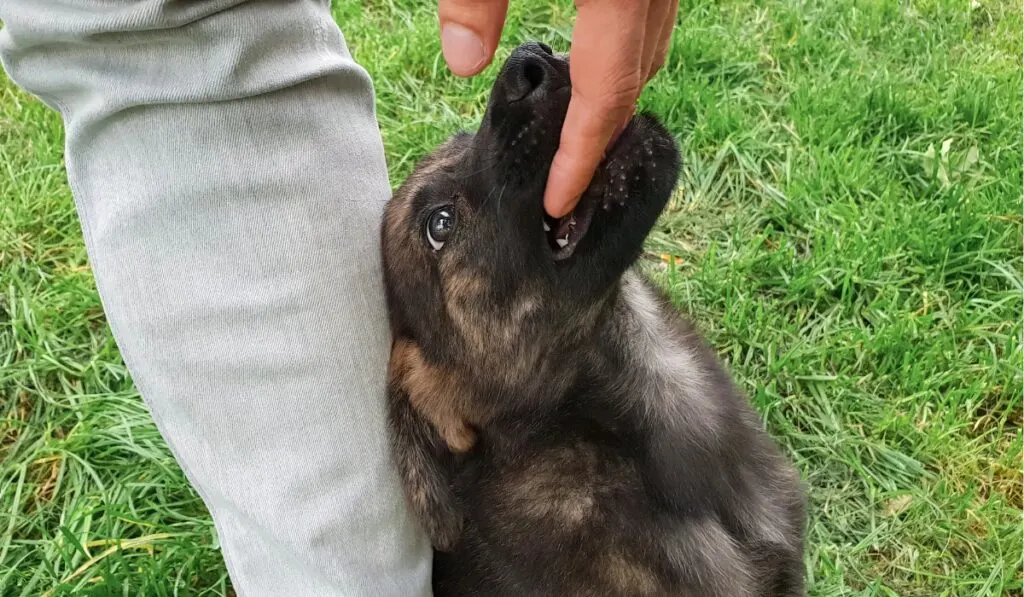Puppies sure do like to nibble and chew, but does it feel like your puppy is picking on you?
This could very well be true, and this article will talk about why your puppy bites you, but leaves everyone else alone.
Puppies taken away from their moms too soon often keep practicing their bite control on their new owner. Other reasons could be teething, being bored, or maybe you are accidentally encouraging this behavior.
Let’s dig deeper into this and cover more about why puppies bite and what you can do about it.

Why Is My Puppy Biting Only Me?
To build upon the primary explanation provided earlier, there are several other factors that might be contributing to your puppy’s biting behavior.
- Your puppy is still learning their bite control
- You might be causing anxiety in them (even unknowingly)
- You could be unknowingly encouraging the behavior
- They could still be teething
- Their breed could play a part
- They might be bored
Firstly, it’s important to note that puppies or dogs are not capable of harboring personal dislikes towards specific people.
I often get asked if a puppy is biting one family member because they don’t like that person. This is not the case, so rest easy. The biting behavior can be attributed to a few factors, which I’ll elaborate on below.
1. Your Puppy is Learning Bite Control
The primary reason your puppy is biting only you could be because they view you as their main caregiver, akin to their mother figure.
If your puppy was separated from their canine mother too early, they missed out on the crucial practice of learning their bite control with her and their siblings.
Puppies, while still with their mothers, start to understand the strength of their jaws, nipping and biting every day.
Mother dogs will sternly reprimand their pups when they bite too hard. This might look harsh, but it’s a critical learning moment for puppies about their bite. If your puppy missed out on this lesson, they’d likely pick who they perceive as their human caregiver and apply the same rules.
2. You Might Be Making Them Anxious (Unintentionally)
Another reason your puppy might choose to bite you could be that they pick up on your nervous energy, or you’re unknowingly doing things that make them anxious.
You might be behaving normally, but your puppy might misinterpret your actions and demeanor.
You might be causing anxiety in your puppy without realizing it by:
Trying to hold, hug, and snuggle your puppy too much. Puppies don’t understand affection the way humans do, so trying to cuddle them could make them uncomfortable.
Speaking loudly or in certain tones. Some puppies are quite shy, and loud voices or shouting can make them anxious. Conversely, your tone of voice and volume might be causing them to get overexcited.
Over-interacting with them. There’s a chance you’re interacting, playing, or paying too much attention to them. Puppies perceive most things as an invitation to play, so they might think you want to play all the time. This could also frustrate them, and their bites might be a sign that they need some space. If they want to play, they’ll come to you.
The Puppy Mag Favorites
⭐ Best Low-Calorie Puppy Treats (and healthy!)
⭐ Best Puppy Chew Toys (and durable!)

3. You Could Be Encouraging The Behavior (Unintentionally)
How we react when puppies display unwanted behaviors can greatly influence how they understand the situation.
For instance, if your puppy approaches you and starts to nibble your fingers, if you respond in a way that excites your puppy, they might interpret this as positive reinforcement.
If you quickly pull your hand away (which is a common response), your puppy might perceive this as playful behavior, prompting them to continue their biting.
4. They’re Teething
Teething is a significant phase in a puppy’s growth and development.
Teething can lead to puppies biting and chewing much more than they usually would. This doesn’t explain why they target you, but it’s crucial to bear in mind.
Teething usually starts around 2-3 months and can last until 7 or 8 months.
During this phase, teething pain will occur intermittently, and your puppy will be inclined to chew and bite anything to relieve it. This promotes the teething process, massages the gums, and offers pain relief.
Given that your puppy sees you as their primary caregiver, it’s common for them to seek you out for comfort during teething.
Teething can be a challenging time for some owners, and you may notice a significant reduction in your puppy’s biting habits once teething has ceased.
5. The Breed of Your Puppy
Some breeds are more prone to biting than others. This could have been an unknown factor when you chose your puppy.
While it’s not a critical point in selecting a dog, it can explain a lot during their puppyhood.
Many working, herding, hunting, and retrieving breeds have a genetic predisposition to bite and chew. This behavior is part of their DNA.
6. They’re Bored
Puppies have a short attention span and are constantly seeking stimulating activities. When they get bored or run out of things to do, they may resort to biting and chewing.
Having a variety of puzzle toys available can keep them entertained, but without these, they might opt for your fingers as their next source of amusement.
In this case, your puppy’s biting could be their way of saying “Hey, I’m bored! Let’s play!”
Why Does My Puppy Bite Me and Not My Husband?
There could be several reasons for this…
Association with their canine mother:
Your puppy might see you as more similar to their canine mother, and thus they continue nipping and testing their bite control with you.
Seeing the husband as the alpha:
In some instances, they may perceive your husband as the pack leader and hence avoid nipping or playing roughly with someone they consider high in pack status: the “alpha”.
It’s worth thinking about how each of you interacts with your puppy. Who spends more time with them? Who takes on more responsibility?
Stronger bond with you:
Alternatively, your puppy might choose to bite you because they feel a stronger bond with you. If your husband isn’t as affectionate or close with the puppy, this might cause the pup to keep their distance rather than push boundaries.
So, how can you tell which one it is? Honestly, pinpointing a specific reason can be quite challenging. You’ll need to reflect on your roles and interactions with your puppy and consider household dynamics (who they see as the alpha, etc.).
Effective Ways to Stop Your Puppy From Biting You
Here’s a helpful method to stop your puppy from biting you. It’s a simple training routine that uses positive reinforcement principles.
Here’s what to do when your puppy bites you:
1. Interrupt The Biting
The first thing you should do when your puppy starts biting you is to interrupt their action. A good way to do this is by saying their name followed by a firm “No!”.
It’s very important for your puppy to understand the word “No!”. You will use it many times. Say “No!” in a deeper voice than usual.
After saying “No!” one or two times, there’s no need to do anything more. This should be enough to show that you don’t like what they’re doing.
2. Guide The Biting
After getting your puppy’s attention and telling them “No!”, it’s important to guide their biting to a suitable toy.
Puppies often bite and chew things they shouldn’t because they don’t know what they’re allowed to chew and what they’re not. That’s normal!
3. Guide your puppy to a toy that they can chew.
Puppies can get bored with their toys, so it can help to swap out a couple of toys every few days or once a week. This keeps your puppy interested in “new” toys. (To do this, it’s good to buy a pack of long-lasting toys)
4. Praise Them When They Focus
After your puppy focuses on their toy, it’s important to give them lots of praise and a tasty treat.
Wait at least 5 seconds to make sure they keep focusing on the toy. If you reward them too soon, they might think they’re getting a treat for biting your fingers, which is not what you want.
Why Does This Work?
It might seem too simple, but it does work.
At first, your puppy might not focus on their toy right away. They might test your patience a little. But when they finally focus on the toy, you need to reinforce this behavior.
With a week or two of consistent training and redirecting their chewing behavior, they will eventually understand to only chew what they’re allowed to.
This works because puppies want to please their owners and do the right thing. I know it might not seem like it, but it’s true.
Once a puppy knows what’s right and what’s wrong, they usually stick to the rules, unless they’re stressed, upset, or not having their basic needs met.
Positive reinforcement like this is the best way to train a puppy. With enough repetition and rewards, you can teach a puppy anything.
What NOT To Do:
It’s important to know that there are good and bad ways to train your puppy not to bite.
I’ve seen a lot of people give wrong advice to new puppy owners, like:
❌ Closing their mouth after they nip you
❌ Holding them on their back to show you’re the boss
❌ Using a muzzle on them
❌ Incorrect types of time-outs
❌ Hitting or punishing the puppy (even gently)
Why It’s Important For Puppies To Have Their Own Space
You might have been surprised when you read that the best response to your puppy nipping you is to remove yourself, not the puppy.
This can be a problem if your puppy lives in the main areas of your home, which shouldn’t be the case until they’re trained and well-behaved.
Puppies need limits and they need to understand that they don’t run the house. They should have their own specific area (a room or a puppy pen) where they have their toys, crate, water, and everything they need to be comfortable.
So, if you need to ignore your puppy because of unwanted nipping, you can simply leave their area without any inconvenience.
Training puppies can be much more difficult if they don’t have a dedicated space of their own. If they’re contained in a specific area, it’s much easier for you, as their owner, to control the environment and their behavior.
Of course, it’s good for your puppy to bond with you and occasionally explore other rooms in the house. But during the early stages, before they’re trained and better behaved, it’s beneficial for them to spend most of their time in their designated area.
P.S Don’t forget to invest in some appropriate puppy toys like these
Kong Natural Teething Rubber Toys
Rocket & Rex Puppy Selection Teething Toys
Assorted Puppy Toys for Teething
Conclusion
By now, you should understand why your puppy might be biting only you and not others. It’s plausible that your puppy perceives you as a maternal figure, especially if they were separated from their canine mother too early. This implies they are still learning about their biting capabilities and are testing these limits with you.
On the other hand, your puppy may perceive your actions and behavior as conveying negative energy or inducing anxiety, which could prompt this biting behavior.
Applying the steps outlined above should yield a positive outcome in a relatively short period. It’s crucial to remember that behaviors not reinforced will eventually cease. Continue to be patient and consistent with your training. Remember, your puppy is just learning and will need your guidance to navigate these developmental stages.
